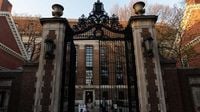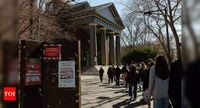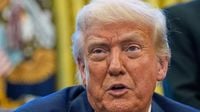In a significant escalation of tensions between the Trump administration and Harvard University, the government has formally demanded a decade's worth of records from the prestigious institution, focusing on foreign funding and affiliations. This move is seen as part of a broader crackdown on U.S. universities that have been criticized for their handling of pro-Palestinian protests and perceived antisemitism on campus.
On April 18, 2025, the U.S. Department of Education sent a letter to Harvard President Alan Garber, claiming that the university had filed "incomplete and inaccurate" reports regarding foreign donations between 2014 and 2019. Education Secretary Linda McMahon stated that this request is the administration's first step to ensure that Harvard is not being manipulated by foreign entities. However, the letter did not provide any evidence of such manipulation.
Harvard has responded robustly, asserting that it has complied with all legal reporting requirements. A spokesperson for the university noted, "As is required, Harvard’s reports include information on gifts and contracts from foreign sources exceeding $250K annually. This includes contracts to provide executive education, other training, and academic publications." The university has also faced demands for records concerning expelled foreign students and visiting researchers connected to foreign governments.
The Trump administration's actions have not only included the records request but also a review of up to $9 billion in federal grants and contracts to Harvard. Following the university's refusal to comply with various government demands, $2.3 billion in federal funding has been frozen. This funding freeze is part of a larger strategy by the administration to reshape elite higher education in a manner that aligns with its ideological stance.
Trump's administration has threatened to revoke Harvard's tax-exempt status, claiming that the university's alleged failure to address antisemitism on campus violates the conditions required for maintaining its 501(c)(3) nonprofit status. The IRS is expected to make a determination on this matter in the coming weeks. Trump stated on his Truth Social platform, "Perhaps Harvard should lose its Tax Exempt Status and be Taxed as a Political Entity if it keeps pushing political, ideological, and terrorist inspired/supporting 'Sickness?'"
This aggressive stance has drawn criticism from rights groups and legal experts who argue that the administration's actions constitute an attack on academic freedom and free speech. Genevieve Lakier, a First Amendment scholar at the University of Chicago Law School, emphasized that the U.S. Supreme Court has laid out essential freedoms for colleges and universities, which include autonomy in teaching and governance.
Harvard's President Garber has made it clear that the university will not surrender its independence or relinquish its constitutional rights. In a public letter, he stated, "The University will not surrender its independence or relinquish its constitutional rights." This rejection of the administration's demands places Harvard at the forefront of a conflict that has seen other universities, such as Columbia, capitulate under similar pressure.
In addition to the funding freeze, the Trump administration has begun deporting some foreign protesters and revoking student visas for those involved in protests. Reports indicate that at least 1,024 students across 160 colleges and universities have had their visas revoked since late March 2025. This crackdown has raised significant concerns about the rights of international students, who make up a considerable portion of Harvard's enrollment.
International students account for more than 27% of Harvard's current enrollment, with over 10,000 students from around the world, including 321 from India. The Trump administration's threats to sever the university's line of international students could have devastating consequences for Harvard, which has long been a symbol of academic excellence and diversity.
Amidst this turmoil, Harvard is also facing economic pressures. The university's endowment, while substantial at $53 billion, is largely restricted by donor terms, leaving only about 20% of its funds discretionary. This financial strain has led Harvard to implement a hiring freeze and seek additional funding through the bond market.
The conflict with the Trump administration has sparked a cultural counteroffensive, with many prominent figures in academia and beyond rallying in support of Harvard. Massachusetts Governor Maura Healey praised the university for standing up against what she described as a brazen attempt to bully educational institutions. Former Harvard President Larry Summers echoed this sentiment, calling the university's stance the right one.
Conversely, Republican lawmakers have criticized Harvard, arguing that it has failed to uphold its founding motto of truth and integrity. Representative Elise Stefanik (R-NY) has called for a total cut-off of taxpayer funding to the university, reflecting a broader partisan divide over the issue.
As the situation develops, the implications for Harvard and U.S. higher education as a whole are profound. The university's refusal to comply with the administration's demands could set a precedent for other institutions facing similar pressures. The struggle for academic freedom, the rights of international students, and the integrity of educational institutions hang in the balance.
In the wake of these events, Harvard's ongoing battle with the Trump administration highlights the complex interplay between politics and education. The university's commitment to its principles may very well shape the future of higher education in America, as it stands firm against what many see as an unprecedented governmental overreach.








